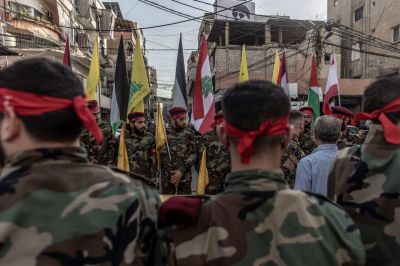Zero rewards for Iran in Lebanon

Much discussion is now emerging about the “day after” the Gaza war. Arrangements for the beleaguered Strip will have to be worked out principally between Israel and the US to settle the status of Gaza following the ending of the fighting and the downsizing, if not all-out defeat, of Hamas. When it comes to auxiliary arrangements for Lebanon after the guns fall silent in Gaza, some potentially disastrous pitfalls will need to be avoided.
After the unconscionable that happened in southern Israel on October 7, it would be a mistaken delusion to consider further concessions to “pragmatic” Iran in Lebanon as somehow constituting a guarantee of future security and stability on the Lebanese-Israeli border when the war in Gaza comes to an end. Iran from the start has been attempting to fool everyone — Americans, Europeans, Israelis, Arabs, and Palestinians, with its version of deep taqiyya, or precautionary dissimulation. Such taqiyya is an integral part of apocalyptic Mahdism represented by the Khomeinist ideology of Wilayat al-Faqih, an ideology that when combined with nuclear capabilities constitutes in its toxicity an unprecedented challenge that neither Israel nor the West have had to face before in the Middle East region.
Iran did not avoid escalation of the current war in Israel’s north out of the goodness of its heart or purity of its intensions thereby necessitating some sort of reciprocation with rewards. Instead, Iranian self-serving pragmatism wishes to preserve Hezbollah, the cornerstone military asset in its project of imperial expansion into Arab lands, for another day of fighting at its own choosing. The carefully crafted imperial thrust by Iran into Iraq, Syria, Lebanon, and Gaza, augmented by the Houthi theater in Yemen, had as its primary objective to create strategic depth at Arab expense for the troubled regime in Tehran.
As matters stand, Hezbollah is already too strong in Lebanon, but it seeks under an international post-Gaza cover a deeper military entrenchment in parallel with a tighter stranglehold on the country and its people than it currently enjoys. And make no mistake: Hezbollah’s leader Nasrallah has himself said it in public on numerous occasions that their ultimate objective is to create in Lebanon an Islamic state identical to that in Iran. It should be noted here that most Lebanese do not support Hezbollah, or its unilateral launch on October 8 of hostilities against Israel as part of the “unified fronts” strategy of the so-called Sector of Resistance led by Iran, not to mention Hezbollah’s illicit political and military control over much in today’s Lebanon. This Lebanese majority opposed to Hezbollah is composed of most of the Christians and Sunnis — already together comprising over 50% of the population — plus most of the Druze, and a good number of brave Shiites.
Their opposition to Hezbollah rests primarily on their rejection of the group’s anti-Lebanese subservience to an alien foreign power. Hezbollah is the armed Iranian proxy that protects the corrupt ruling mafia that defrauded the country by stealing people’s money in collusion with the crooked banks. Hezbollah is purposely keeping Lebanon in a state of open-ended political stasis and economic freefall — no reforms, no presidential elections, no new government, no investigation into the devastating Beirut Port explosion of 4 August 2020, nothing. Adding insult to injury, Hezbollah has carved out its own confederal statelet to encompass Lebanon’s south, Beirut’s southern suburbs, and parts of the Bekaa Valley, where neither the Lebanese state nor Lebanon’s legitimate security forces exercise any sway. This Hezbollah-stan entity comes complete with its own army, its own insulated mini-economy resting largely on smuggling, its own foreign policy, and its independent declarations of war as well as truce deal-making when that is deemed suitable. It was Hezbollah that facilitated the demarcation of the maritime border between Lebanon and Israel as their way of showing the Lebanese who is boss while simultaneously fortifying their entrenchment in the country.
Talk abounds about finalizing the demarcation of the land border between Lebanon and Israel, about moving Hezbollah fighters out of the immediate border region some 30 kilometers to the north beyond the Litani river — either through an agreement or by force — about implementing UN Security Council Resolution 1701 that would ensure a tranquil no-man’s land free of Hezbollah military assets in the border area with Israel, and so on. All sounds fine, but it is far from enough. Unless Hezbollah’s iron grip over Lebanon is seriously challenged, little will have been achieved and major future headaches for Israel, the Arab region, and the West will have been allowed to gestate under the guise of the new security arrangements — it would mean reverting back to pre-October 7 calamitous thinking on vital security issues.
This is how Iran operates through its proxies, and Gaza’s painstaking tunnel network is a glaring testimony to the kind of patient entrenchment that Iran is bent on achieving, incremental carpet-weaving style. In Gaza there was no popular opposition to Hamas, but in Lebanon Hezbollah is far from popular, or from being assured of any mass support across the various Lebanese communities.
Taking this reality into account, any new policy towards Lebanon must first be premised on beefing up the capabilities of the Lebanese army to begin to serve as a counterbalance to Hezbollah. Also, bolstering the endurance of the population for the long haul in terms of ensuring basic economic needs, affordable access to education, functioning healthcare services, and the wherewithal for the various communities to weather the hard times that have befallen them since the inflicted collapse of 2019 — all this will sustain the domestic environment that is essentially opposed to any Hezbollah domination. A concerted international push for the Lebanese parliament to elect a clean, capable, visionary, and reformist President of the Republic (such persons do exist) — a centrist non-confrontational individual who is also no Hezbollah puppet—should be the focus of any benevolent external involvement in new arrangements for ailing Lebanon.
Lebanon remains potentially very viable, and quickly so, even while Hezbollah is kept in place for now. Despite everything, the country still enjoys the precious commodity of personal and communal freedoms alongside unique human capabilities unmatched across most Arab societies. One way to diffuse the excuse Hezbollah always presents for maintaining its armed resistance in south Lebanon, namely the occupation by Israel of the Shebaa Farms, would be for Israel to evacuate these and place them under reliable and enhanced international military custody. This will help deprive Hezbollah of the pretext for liberation of occupied Lebanese lands.
Further unchallenged entrenchment of Hezbollah in Lebanon translates into deeper Iranian consolidation in Western Asia — bad news for all in the region and beyond. The time has come to put a stop to Iran’s imperial expansion into Western Asia and to begin tangibly to roll it back. American wobbliness, indecision, and absence of resolve in the face of rising provocations from Iran’s proxies send a message of weakness to those who only comprehend the language of force. Do not repeat the same deadly mistakes as before by ignoring the lessons of Hamas’s entrenchment in, and underneath, the Gaza Strip. Do not reward Iran’s regional piracy in Lebanon.
Habib C. Malik is a Senior Research Fellow at The Philos Project, where his work focuses on mapping out Lebanon's current challenges and the best path forward for reform. He holds a BA degree in history from the American University of Beirut and a MA and doctorate from Harvard University in modern European intellectual history. He has taught in universities in Lebanon and in Washington, DC for over 3 decades; and is currently an Associate Professor of History at Lebanese American University (Byblos campus) where he teaches history, cultural studies, and occasional graduate seminars in political science.



























